When And How To Use Epsom Salt For Tomato Plants
As an Amazon Associate and member of other affiliate programs, I earn from qualifying purchases.
Wondering if Epsom salts could be the secret sauce for your tomato garden? In this article, we’ll talk about the potential benefits of Epsom salts, from greener leaves to sweeter tomatoes, and when other fertilizer options are a better choice.
We’ve been growing tomatoes for home and market since 2012, and by sharing our experience on this blog, we’ve helped millions of readers get better results from their tomato plants. So here we’re going to discuss the possible uses of Epsom salts for tomatoes and what we think is the best way to provide for your tomato plants.
What are Epsom salts?
Let’s clear one thing up first. Epsom salt is not the salt we use to flavor food. Epsom salts are the common name for magnesium sulfate -a natural mineral compound containing magnesium, sulfur, and oxygen.
They’re most commonly used as a self-care product for sore muscles, cold symptoms, and in medicated salves. But the ingredients (magnesium and sulfur) are also important micronutrients for ideal plant growth. Because of the ingredients and the ease of access to Epsom salts, many gardeners apply magnesium sulfate around their tomato plants and claim amazing benefits to the vigor, health, and flavor of their tomatoes.
Why use Epsom salt on your tomatoes?
Well, because magnesium and sulfur are very important for the growth and health of tomato plants. These micronutrients are vital for photosynthesis, protein synthesis (including enzymes), and cell wall structure. So it makes complete sense that, under certain conditions, applying Epsom salt to tomato plants will yield better results.
The real key to getting success out of using Epsom salts in the garden is to have a soil test done, and the best soil test is done through your county extension office (google your location plus county extension office). This is important because first of all, adding magnesium and sulfur to your soil is only beneficial if your soil is already deficient in those compounds. Secondly, they are micronutrients – they play an important supporting role in plant growth.
However the main nutrients plants require are nitrogen, phosphorus, and potassium. So it would be vastly more important to know if your soil is deficient in one of those, and a big mistake to think that Epsom salts are the only fertilizer you need for your tomato plants.
It is our opinion that a complete organic fertilizer, like Fox Farm Big Bloom (which contains nitrogen, phosphorus, potassium, magnesium sulfate, and a list of other micronutrients), is a more balanced approach to fertilizing that will really boost your results. However, if you want or need to try the Epsom salts, you should know a few things first.
The best way to apply Epsom salt to tomato plants
Rather than sprinkling Epsom salt on your tomato plants or directly on the soil around plants, it’s best to mix it with water and apply it as a solution. The recommended dosing for Epsom salts is 1-2 tablespoons of Epsom salt per 1 gallon of water and use as a foliar spray or apply to soil every 2-4 weeks. For direct application in the garden when planting tomatoes, apply 1 cup of Epsom salt per 100 square feet and water it in.
Can you put too much Epsom salt on tomato plants?
Yes, it is possible to apply too much Epsom salt to tomato plants. Overapplication of Epsom salt around our tomato plants can cause too much magnesium in the soil and cause a relative calcium deficiency. Also, the soil pH can be lowered if too much is applied at once or if it’s applied too often.
Can Epsom salt prevent tomato blossom end rot?
No. Sorry, it doesn’t do that. Blossom end rot is a stress-induced disorder that affects tomatoes and some other veggies like peppers. It is not usually related to a deficiency of nutrients in the soil, so adding Epsom salts won’t help prevent it.
However, too much magnesium will compete with calcium uptake in tomato plants. So if your soil is deficient in calcium or your pH is not optimum for calcium uptake, adding Epsom salt will actually make it more likely that you’ll have tomatoes with blossom end rot.
Related reading:
How To Fix And Prevent Blossom End Rot.
The Epsom Salt Myth: article by North Dakota State University
Try planting these disease resistant tomato varieties.
Blossom end rot on a green tomato.
Does Epsom salt make tomatoes taste sweeter?
Maybe. Epsom salt contains the micronutrients magnesium and sulfur. Growing flavorful tomatoes depends on many factors including a healthy micronutrient supply in the soil.
So by adding magnesium and sulfur to the soil, some gardeners may find that Epsom salt has a positive effect on flavor. But this is only if your soil is already deficient in micronutrients. The plants only take up what they need, and as stated above, it can compete for uptake with other micronutrients if it’s largely out of proportion.
Besides, without knowing for sure if your soil is deficient in micronutrients, then perhaps a more balanced fertilizer is a better option than using Epsom salt alone.
Should you be fertilizing your tomatoes with Epsom salts?
Probably not. As already discussed, Epsom salt does contain 2 micronutrients but note that they are micro-nutrients. Plants require a lot more nitrogen, phosphorus, and potassium than they do any other minerals. Epsom salt alone is not a good soil additive or fertilizer for your plants.
Trying to substitute Epsom salts for your regular fertilizer is not a good decision. If you want to use it to boost magnesium levels as part of a homemade fertilizer, then that makes sense. If you go this route, note that you should not mix Epsom salt with acidic materials like vinegar or lemon juice, as this can reduce nutrient uptake. Also, be careful mixing Epsom salt with chemicals or pesticides as unexpected reactions can occur.
Related reading:
Choosing A Fertilizer For Your Veggie Garden
How To Make Homemade Fertilizer
Does Epsom salt treat yellowing leaves on tomato plants?
Possibly. A magnesium deficiency can cause yellow tomato leaves with green veins. If the yellowing leaves are due to a magnesium deficiency, then Epsom salt may help your plants improve chlorophyll production giving them more green color. However, using a balanced organic fertilizer will be more effective.
Can Epsom salt be used for natural pest control?
Not effectively. There are some claims that Epsom salt is a deterrent for some garden pests like beetles and can kill slugs. Wouldn’t it be nice if pest control were that easy?
Unfortunately, there is no simple solution for pests in the garden. Hand removal of pests and frequent application of organic deterrents like neem oil and pesticides like Bt (for hornworms and caterpillars) are the best options for organic gardeners.
Related reading:
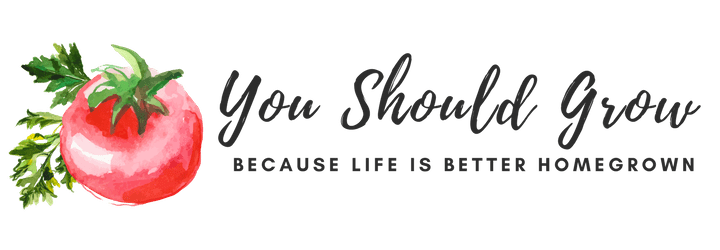

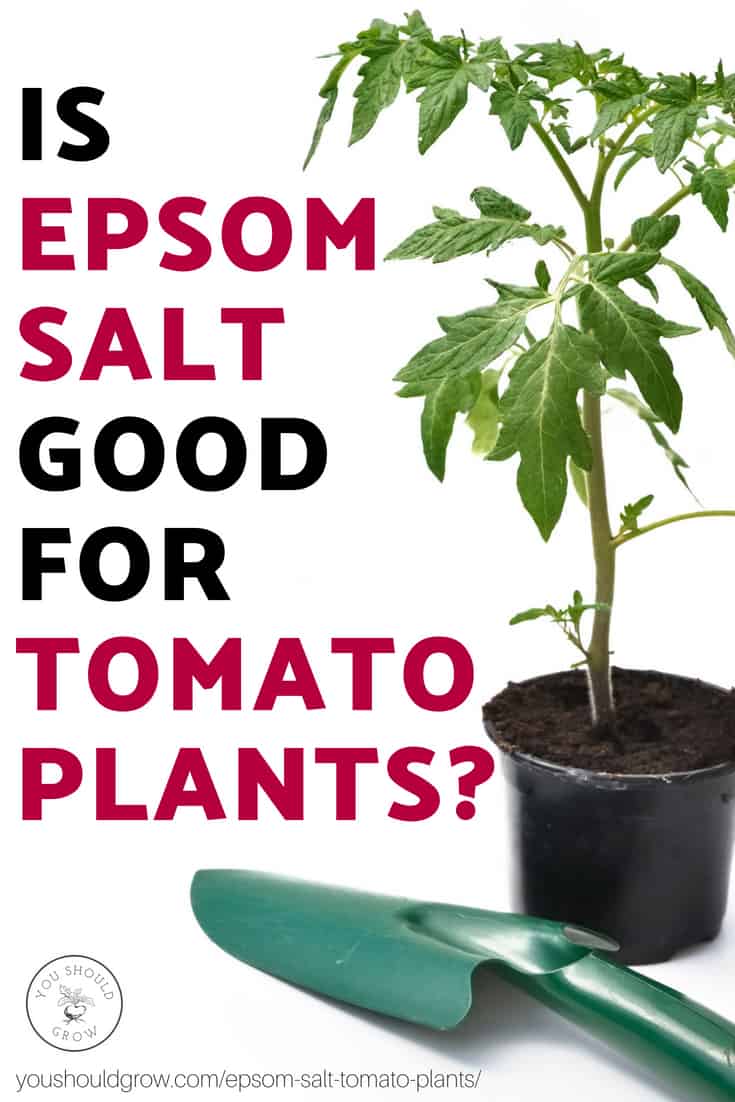
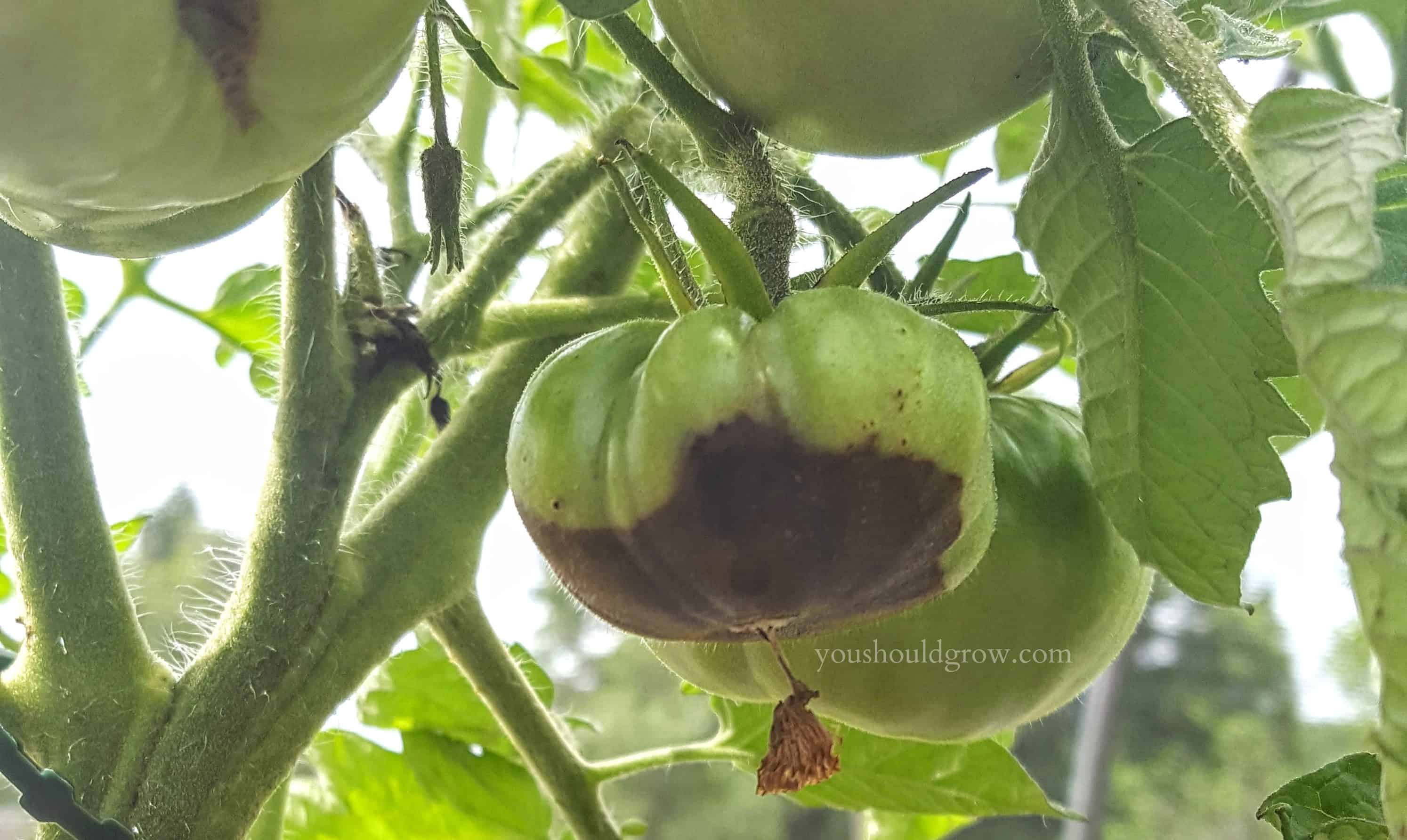
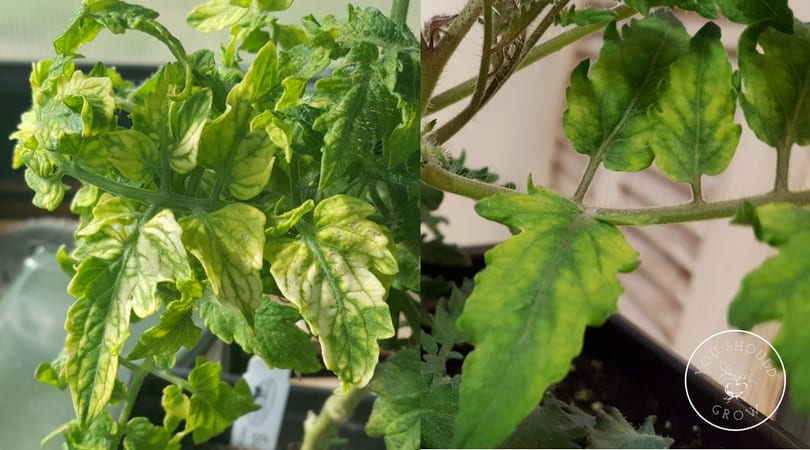
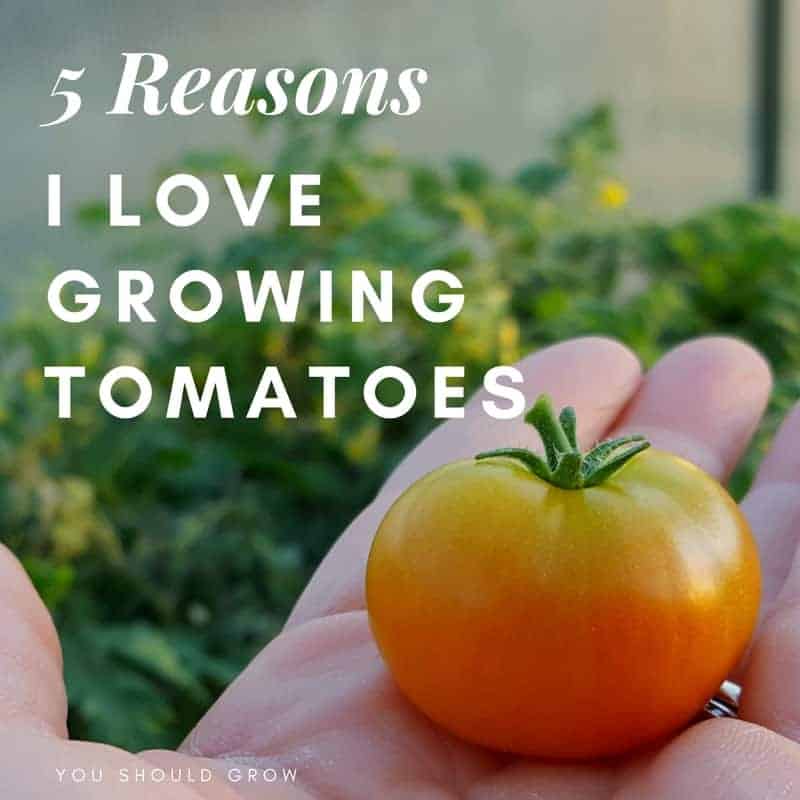
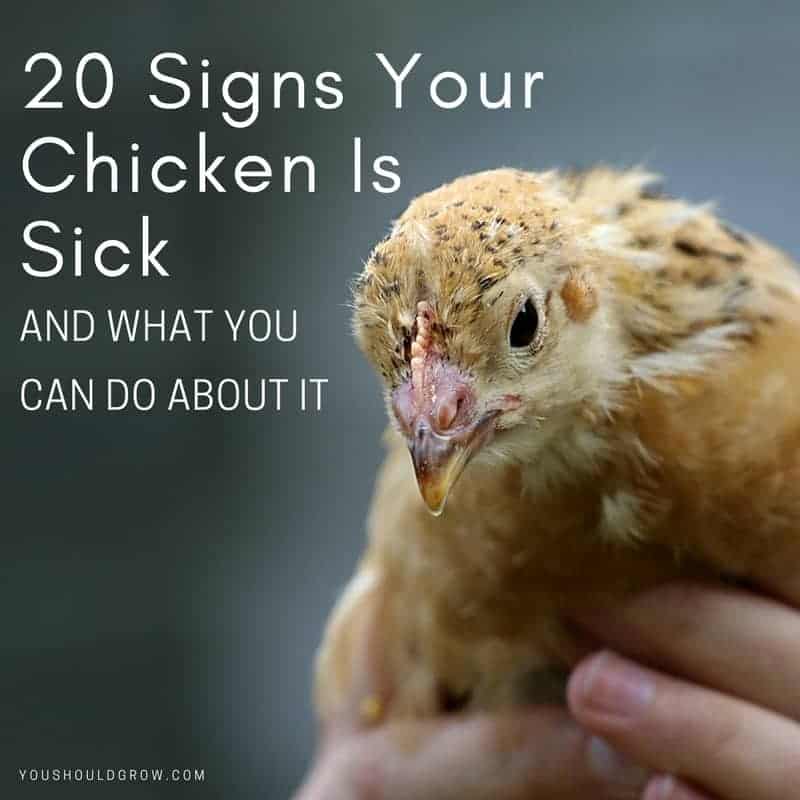
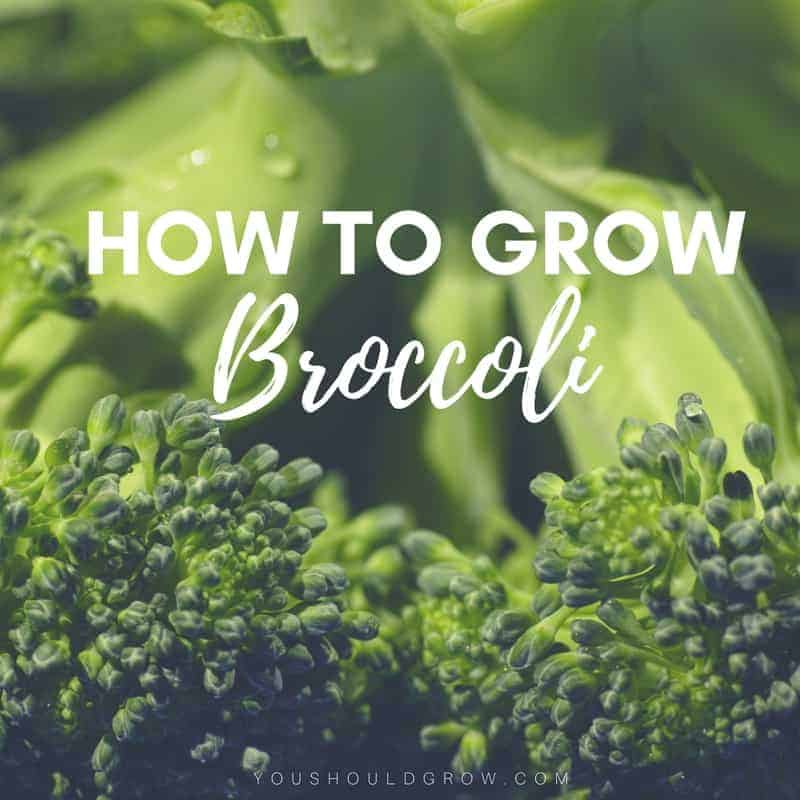
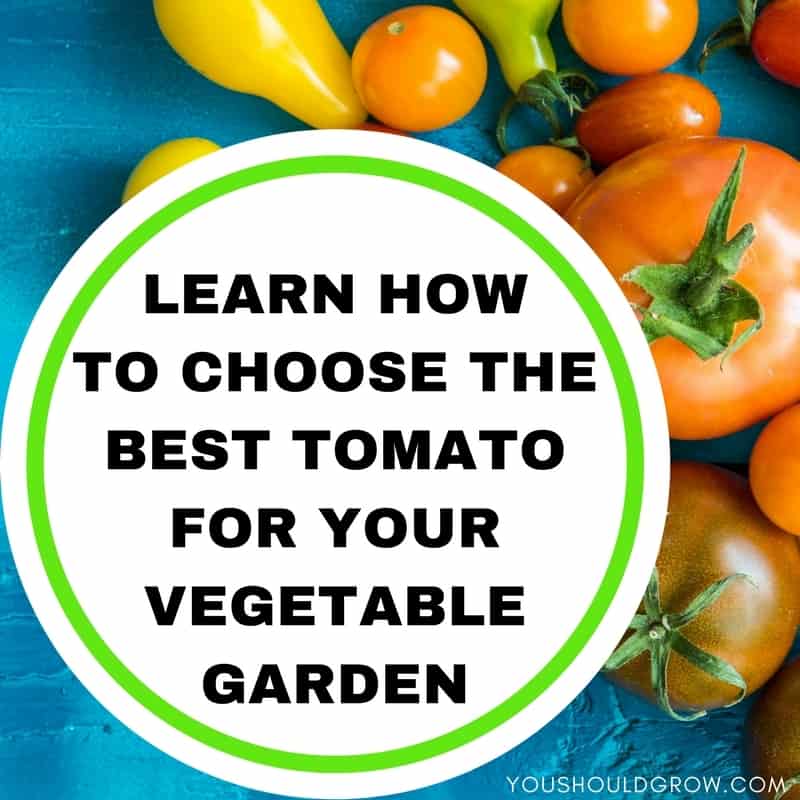
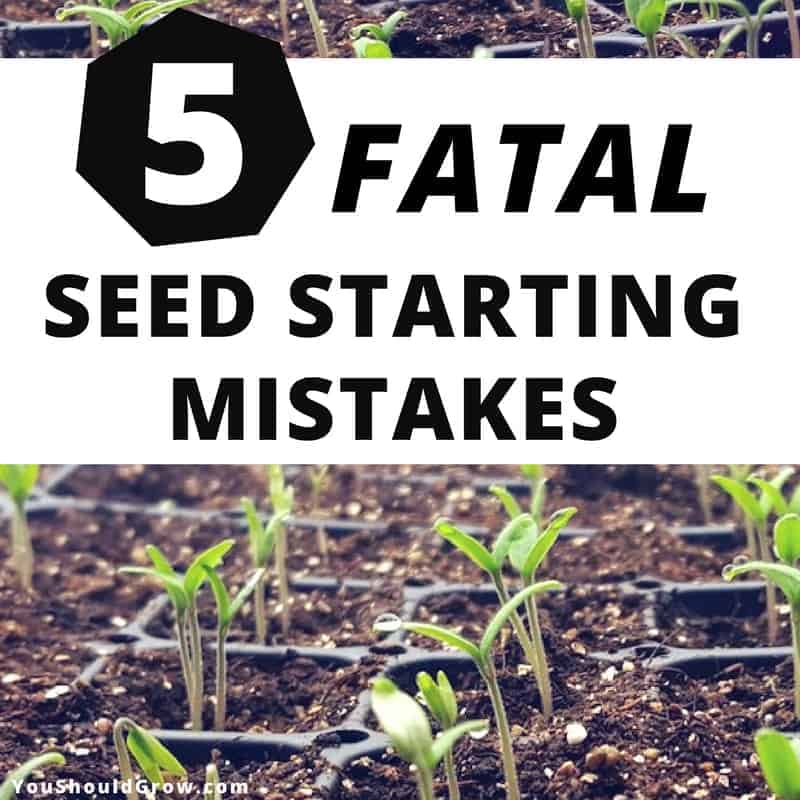
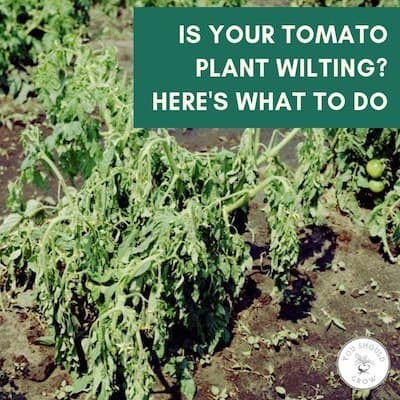
This was very interesting and I appreciate knowing more about the use of Epsom salt in the garden. I’ve used it a little bit, “just because.” I feel more knowledgeable about it now. I’m also a gardener and write about it. My grown son just recently started showing some interest in gardening, so I’m happy for you that your children are.
I’m glad I could shed some light on the subject! 🙂 Thanks, Michelle!
do you or any one knows Epson salt works on Tomatoes is it good or not
If your soil needs magnesium, then Epsom salt can help. Otherwise, it’s not necessary. The only way to know if your soil is deficient in magnesium is to have a soil test done. I hope that answers your question.
Why do my tomatoes have a tough skin? Also where can I have my soil tested?
Hi, Jean! Tough skin can be caused by hot, dry weather. But sometimes it’s just variety specific. You can have your soil tested at your local county extension or use a mail in service using a kit like this one on Amazon
What is a local county extension?
Hi, Gaile! County extension offices are like branches of state universities that allow you access to their resources. They’ll do things like analyze your soil quality and even diagnose plant diseases. You can find your county extension office here: https://en.wikipedia.org/wiki/Cooperative_State_Research,_Education,_and_Extension_Service
My father always used Epsom salts on his fruit trees when I was younger and we always had big juicy fruit he put it on every few weeks from before flowers to fruiting but it could have been longer periods in between
How nice to grow up eating juicy fresh fruit from your yard! Yum!
Thank you so much for this useful info!
I use Epsom salts when we initially plant our our little plants from the greenhouse. I first dig my hole to the desired depth. I put 2 T of Epsom salts in the hole, then scratch the salts lightly to mix with the soil. Then I water my plant with a good soaking of water, with a water solvable organic fertilizer. Then every other week I dissolve 1 T of Epsom salts to my large sprinkling can, with the organic fertilizer, wetting the plant and leaves. This is the only time I allow the leaves to get wet, unless it rains. Once the fruit starts to set on well, I no longer add the Epsom salts. I know we have had no transplant shock to our plants, and see growth in the first week. I’m a believer, but I live along the Colorado Front range. The soil needs conditioning, but the organic fertilizer has helped.
Hi, Kathy! Epsom salts definitely have their place in organic gardening. It’s just about knowing why they work so you can use them appropriately. I’m glad to hear you are having good luck with your tomatoes. That’s the most important thing! 🙂
We fill our deep sunken bath with hot water, then add one cup of Epsom Salts, plus one tablespoon of bicarb, then relax in luxury for up to thirty minutes. Later, when the water has cooled, we pipe it down to our orchard and give each of our 100+ citrus trees a half-bucket each. The only other ‘fertilisers’ we add are SeaSol (a seaweed extract) and sheepsh*t. Our citrus trees (oranges, lemons, grapefruit, mandarins and tangelos) have all improved since we commenced this practice. Tomato plants? We use a blended mixture of coffee grounds, banana skins and eggshells. Tomato ‘trees’ thrive on this mixture!~
Hi, Paolo! Great ideas. Sounds like you’ve found a great homemade fertilizer. The seaweed extract and animal waste are great for plants. Thanks for sharing!!
Thanks for a very informative article. Helped me a lot!
So glad to hear that! Thank you!
Thank you so much for your insightful article! I’ve never used Epsom salts in my garden, and although I keep intending too, I’ve backed off because I didn’t feel I had enough information about the pros & cons. I’m truly grateful to you for giving me this clarification. As with all things in life, I find it’s best to just move slowly with changes, & if it ain’t broken, don’t fix it. I find that by doing my veggies and flowers in containers, I can provide each plant with just the right soil for optimum growth. I really appreciate your instructions. Thank you!
Hi, Nikki! Thanks for your nice comments! Container gardening is a great way to get around all kinds of soil problems. So glad you’re having success with it!
Containers? Please be careful… . A few years ago we created a large ‘container garden’, comprising over fifty large (100 litre) plastic crates. Elevated, these overcame problems with rabbits, roos and many other free diners. We grew most of our food in these containers. Alerted by friends to some of the dangers of plastics (See https://www.mayoclinic.org/healthy-lifestyle/nutrition-and-healthy-eating/expert-answers/bpa/faq-20058331 ) we switched to plastic-free raised gardens, recycling long lengths of metal roofing, to create long, high garden beds. These now provide year-long, BPA-free vegetables in season.
I accept that suburban living restricts this kind of large scale project… but I’m concerned whenever I read that folk are using BPA-laced plastic containers, or chemically-treated wooden containers, to grow food. It’s just not worth the risk.
I was just about to try epsom salts on my tomatoes and I’m glad I read your article. I have had an issue with blossom end rot in past seasons and don’t want to risk making it worse. Epsom salts did wonders for my roses however!
Epsom salts definitely have their place in the garden!
Hello. Epson Salt definately works. My tomatoes are healthy, juicy and huge. I also sprinkle 1 cup Epson salt and 1 cup coarse salt around my citrus trees every 6 months and I have beautiful fruit. My Barberton Daisy plants just love the Epson salt water.
Greetings from South Africa !
Please give me measurements for making watering solution for my tomatoes. They are in containers. Thanks
I, too, have wanted to use Epsom Salts in my garden but wasn’t quite sure how — Great artlcle!! I do have one question, however, how do you keep banana peels until you need them in your garden? in the refrigerator? I’d be afraid if I kept them on the counter, they would get moldy — and I struggle keeping used coffee grounds that long without them getting moldy…
Hi Laura:
Nice and informative article on use of Epsom salt in tomato and other garden plants! I thought I should correct a piece of information in the article — for the benefit of those who might need it for future reference: Magnesium (Mg) and Sulfur (S), which are plant nutrients contained in Epsom salt are actually “secondary macronutrients” and not micronutrients as presented in the article. They are next to NPK in the amount needed by garden plants. Where Mg and S are deficient, one expects Epsom salt to correct such deficiencies. Where soil/growth media tests show that these elements are adequate, Epsom salt is not likely to add any value to the growth of the garden plant.
Do you have any information or experience on using Gypsum salt to correct Calcium deficiency and by extension, tomato blossom end rot?
Thanks for sharing your article!